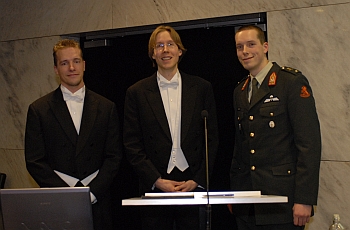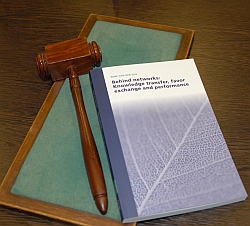Behind Networks: Knowledge Transfer and Favor Exchange in Research and Development Labs
 On January 30, René van der Eijk has defended his PhD thesis entitled “Behind Networks: Knowledge Transfer and Favor Exchange in Research and Development Labs”. Firms’ success in today’s marketplace depends on their ability to innovate. Faced by this emerging reality, companies are spurred to manage, (re)combine and increase their knowledge stocks. This development has led to a recent and marked interest in the benefits of networks and technological aids for improving knowledge transfer. But the real question, as this dissertation posits, is not so much what processes aid knowledge flows but how knowledge comes to be transferred to begin with. Companies’ interests are obvious but not necessarily in line with those of its employees. Why would knowledge workers want to share knowledge in light of the potential costs?
On January 30, René van der Eijk has defended his PhD thesis entitled “Behind Networks: Knowledge Transfer and Favor Exchange in Research and Development Labs”. Firms’ success in today’s marketplace depends on their ability to innovate. Faced by this emerging reality, companies are spurred to manage, (re)combine and increase their knowledge stocks. This development has led to a recent and marked interest in the benefits of networks and technological aids for improving knowledge transfer. But the real question, as this dissertation posits, is not so much what processes aid knowledge flows but how knowledge comes to be transferred to begin with. Companies’ interests are obvious but not necessarily in line with those of its employees. Why would knowledge workers want to share knowledge in light of the potential costs?
The answer, as this dissertation argues, lies (partly) in the observation that knowledge transfers continue to take place (efficiently) outside of the market (or hierarchy for that matter), by means of interpersonal gift exchange cycles. In the context of innovations, for instance, relational ties and networks do play a crucial part in locating and accessing relevant knowledge. As such informal (and formal) cooperation between corporate scientists within and between firms is not an unknown observation, but tends not to be conceptualized in terms of gift exchange. René van der Eijk argues that the notion of gift exchange allows one to explain why persons exchange knowledge with each other even if they are not obliged to by contract or instruction.
Empirically, René van der Eijk generates a network perspective of knowledge exchange using Social Network Analysis. In particular, he tests the supposition that creative and productive researchers are more likely to inhabit favorable network positions and actively engage in exchange.
His promoters are <link people steef-van-de-velde _blank>Prof. dr. Steef van de Velde, Professor of Operations Management & Technology, Rotterdam School of Management, Erasmus University Rotterdam and Prof dr Wilfred Dolfsma (Groningen University). Other members of the Doctoral Committee are Prof.dr. L.C.P.M. Meijs, Prof.dr. P.M.A.R. Heugens and Prof.dr. J. van den Ende.
About René van der Eijk
René van der Eijk studied in the Netherlands, United States and Germany graduating Cum Laude as an economist at the Erasmus University Rotterdam. He received a master’s degree in Business Economics exploring the role of person-organization fit in organizational entry, recruitment, selection and newcomer socialization in his MA thesis. He worked as a researcher (A.i.O) at the Department of Management of Technology and Innovation at the Rotterdam School of Management, Erasmus University. Key research interests include person-organization fit, entrepreneurship, knowledge sharing, performance, social networks and innovation. René van der Eijk obtained his doctorate in business administration in the area of innovation. He has been working on the subject at several multinational companies and has spoken on the topic at various international conferences. René van der Eijk has written and published articles on innovation, knowledge sharing and social networks.
 Abstract
Abstract
The value of knowledge for economic development can hardly be overstated as it essentially determines what organizations do as well as how they do it. To ensure firm survival or meet fierce competition, organizations are required to continually improve their product and operations. That is, upgrade their knowledge base and develop new knowledge on how to do the right things more efficiently. Managing organizational knowledge and stimulating its development means that firms must carefully consider their knowledge development and diffusion strategies. Doing so, as this book argues, requires practitioners to realize that knowledge development and diffusion is a social cooperative process. At its most basic level new knowledge is created as a result of human interaction. Knowledge is shared between individuals and is fueled by micro-objectives and motivations. Applying a micro perspective, this book posits that knowledge exchange resembles the exchange of gifts. It follows that professional networks, as the conduits through which knowledge is exchanged, are an important determinant for scientists’ performance. Utilizing the full potential of organizational scientific and human technical capital requires firms to map, shape and encourage individual network formation.
More Information
- Pictures of the Defense
- <link doctoral-programme phd-in-management phd-projects detail>Full Text of the Dissertation


